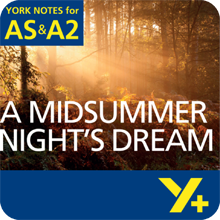Examiner's Notes
You assessed this answer as a C grade.
Hover over the highlighted text to read the examiner’s comments. These are linked to the Assessment Objectives, which are listed in the side panel.
Theseus is a character from Greek myth who would be familiar to an Elizabethan audience. They would recognise him as the fierce and heroic warrior who conquered the Amazons and slayed the Minotaur. As such, there is an expectation that this character will carry authority and power, ruling absolutely over his people. To a certain extent this is borne out as the play progresses, however, there are elements of his presentation that seem to undermine this.
In this three-part comedy we meet Theseus at the beginning and the end. The scenes in which he features frame the play. It could be argued that these appearances at the points of key conflict and resolution indicate an overarching authority over the rest of the action; for example, by abandoning his plans to hunt in Act IV Scene 1 on entering the woods, and overruling Egeus’s further demands for justice in order to allow the young lovers to wed, he shows himself to be a ruler entirely at ease with power. Yet, there are chinks in his armour, as we shall see.
In Act I Scene 1, his imminent marriage to Hippolyta, Queen of the Amazons, seems to confirm his status as an ultimate figure of authority. Not only does he rule over Athens, but he has also conquered the female society of Amazons. One could argue that this implies a patriarchal superiority to all women. However, it is clear that Hippolyta is unenthusiastic about their wedding. Whereas time seems to be going too slowly for Theseus, for Hippolyta ‘four days will quickly steep themselves in night‘ (I.1.7). Theseus’s failure to enthuse her suggests that his authority is limited to the military sphere. He may have defeated the Amazons by force, but he cannot control the queen’s emotions.
In Athens, though, a city famous for its great thinkers, Theseus holds the ultimate position of authority. When Egeus brings Hermia to him, Theseus, like the philosophers associated with the city, shows himself to be a man of reason. Egeus addresses Theseus as ‘our renowned Duke!’, ‘my noble lord’ and ‘my gracious Duke’. These somewhat fawning terms reinforce Egeus’s deference to the duke’s power. Egeus’s use of the collective pronoun ‘our’ emphasises Theseus’s position as ruler of all the populace of Athens. However, there is also potential for comedy here in the dramatic presentation of Theseus. Rather than a ruthless killer and warrior, some interpretations might offer the audience a respectable middle-aged gentleman and to an extent might be seen as undermining his authority.
Ultimately, Theseus seems to control the fate of his people. With his words ‘Upon that day ... prepare to die’ (I.1.86) he demonstrates that he can determine the outcome of the dispute between Hermia and Egeus. His ability to overrule even a father’s say in his daughter’s future seems to show an unquestionable authority. Nonetheless, Hermia does have her way in the end and is able to marry the man she chooses. Although Theseus sanctions the marriage, it could be suggested that his authority is undermined by the lovers; indeed that real power resides not in earthly political structure, but supernatural order as decreed by Oberon.
At the opposite end of the social scale are the craftsmen. Elliot Krieger argues that these characters are exploited workers who find themselves ‘incorporated into the ruling-class vision of society’. We see evidence of this in their presentation as clowns. They are shown as foolish characters unable even to grasp the concept of the audience’s imaginative role in a performance. Snout worries that ‘the ladies [will] be afeard of the lion’ (III.1.21). Apart from Bottom, the craftsmen are all underdeveloped characters, and it could be argued that their lack of presence reflects the lack of status for real life craftsmen at that time. Bottom’s name seems to suggest that in terms of society, he is in fact on the lowest rung of the social ladder. When the craftsmen perform at the wedding, Theseus allows demoralising comments about the craftsmen’s play to be heard by them. He has no need to show respect to those lower down in the social order.
